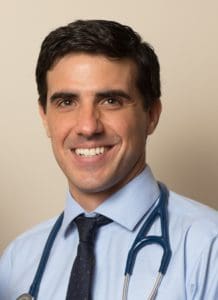When it comes to cigarettes, even having one a day is no good. Every cigarette increases your risk of a wide range of serious health issues, including lung disease, emphysema, lung cancer, COPD, as well as heart disease, stroke and more. The factors that influence why and how often we smoke are numerous; some are physiological and some are psychological. In helping my patients with smoking cessation, I find it very valuable to always ask what the upside of smoking is for them.

Orange Regional Medical Group Primary Care Medical Director
The reasons vary, but are often related to stress and relaxation. Taking that important step to identify reasons and triggers for smoking helps us get to the root of the issue. Then, rather than focusing on negative consequences and using those as reinforcement, we can recognize that smoking satisfies an important need for that patient and can decide on a course of action to help them address the emotional side of their habit, along with its chemical dependency aspect.
CIGARETTES & CHEMICAL DEPENDENCY
Some people are one-a-day smokers, and although smoking that much is not even ideal, these are likely not the people affected by addiction. When people develop pack or multiple pack-a-day cigarette habits, however, that is primarily attributable to nicotine dependency.
Nicotine is a powerful and naturally occurring substance in tobacco. When someone smokes regularly, changes to brain chemistry begin to happen. Eventually, your brain begins to require the nicotine in order to function normally. The phenomenon is similar to what we see in people who need that first cup of morning coffee to get going. When you don’t have the nicotine after becoming accustomed to it, your body just responds differently. As anyone who has ever tried to quit smoking can tell you, your body is really not happy with you when you stop.
TIPS FOR KICKING BUTTS
There are many effective resources available to those who want to quit smoking, from drug therapy to professional counseling and alternative techniques. But, the process of quitting smoking will only ever be as effective as your intentions and actions. So, the best first step toward quitting smoking is to always be deliberate when making day to day decisions that can steer you toward or away from that goal. Think of every craving as a choice, and then take a moment to make the choice you truly want to make. Be accountable to yourself and your goal. Another way to do this is to write down your reasons for quitting. Revisit your list every morning for motivation.
Another tip that I share with my patients is to set a firm quit date and commit to family and friends that you are going to quit on that date. Our closest acquaintances can be a powerful support network when we share our goals with them. You can extend that network by finding a support group for people trying to quit smoking, which is easily done online. There are even groups and services that will send you supportive text messages to help keep you focused on your goal.
For the heavy smokers I see, people smoking more than half a pack a day, I ask them to consider using medication therapy. Drugs such as varenicline, popularly known by the brand name Chantix, help people quit by blocking the nicotine receptors in the brain. Basically, when you are taking Chantix and you smoke, the effects of the nicotine simply don’t register. This helps smokers learn that they can function without the drug, and wean themselves off or even go cold turkey. Drug therapies are often most effective when coupled with counseling, which I have also recommended for patients looking to break an addiction to cigarettes.
IMMEDIATE PAY-OFFS
Some patients find it motivating to know that the positive side effects of quitting smoking begin to happen immediately. Right away, you’re going to start saving money, you won’t smell like smoke – if that is a concern to you – you won’t have to stand out in the cold at work or socially to smoke, and things of that nature.
Within days and weeks, you will begin to notice improvements in your breathing – less coughing, wheezing and shortness of breath. Over the longer term, your lungs can actually heal. Assuming you haven’t done permanent damage, such as receiving a diagnosis of emphysema or COPD, your lungs can be resilient, and the sooner you can stop smoking and limit the damage, the better chance they stand to recover.
The Centers for Disease Control and Prevention also note that within one to two years of quitting your risk of heart disease declines, women of childbearing age reduce their risk for infertility and women who quit smoking during pregnancy reduce their risk of having a low birth weight baby.
THE TIME IS NOW
Smoking is a bad habit that you should kick as soon as possible. Every cigarette has an exponentially negative effect on your body and the positive effects of quitting are immediate. There’s no time like today to start quitting. I am proud to say that I have had quite a bit of success with helping people reach that goal, and my office at Orange Regional Medical Group is here for anyone ready to make the decision to quit.
Joseph Chavez Carey, MD
Board-certified in Family Medicine; fluent in Spanish. Dr. Chavez Carey received his medical degree from New York University School of Medicine and completed his internship and residency at Contra Costa Regional Medical Center, in California.
About Orange Regional Medical Group
Orange Regional Medical Group (ORMG) is a part of the Greater Hudson Valley Health System, along with Orange Regional Medical Center and Catskill Regional Medical Center and Catskill Regional Medical Group. ORMG is a growing Urgent Care, Primary Care and multi-specialty, Hospital-supported medical practice. With Board-certified Physicians, Board-certified Family Nurse Practitioners and Board-certified Advanced Practice Professionals, our staff provides quality healthcare throughout Orange County and surrounding areas. Walk-ins are welcome and same day appointments are available at offices in Middletown and Monroe, NY. For more information including office hours visit www.orangeregionalmedicalgroup.org.




